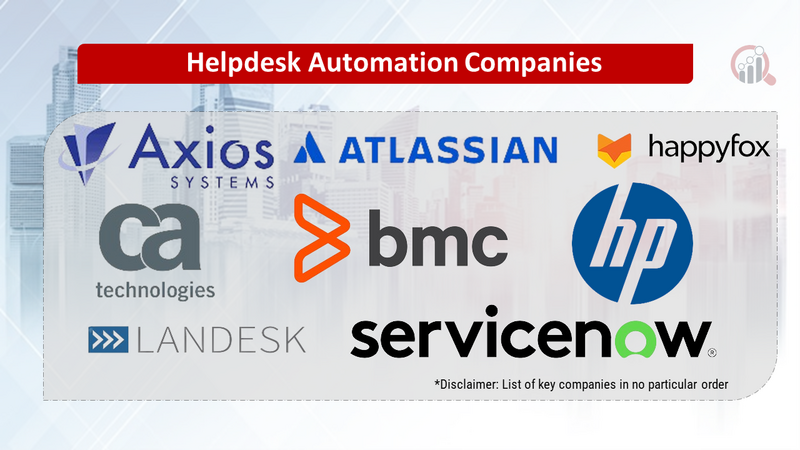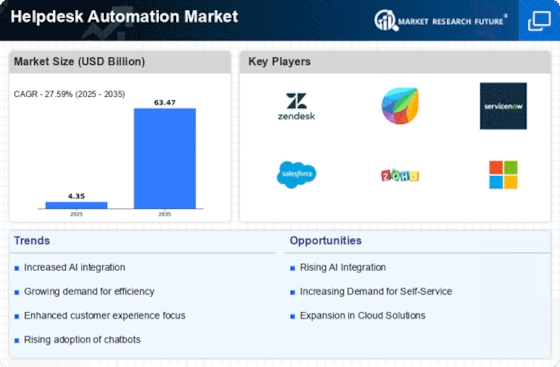Top Industry Leaders in the Helpdesk Automation Market

Helpdesk Automation Market: Dive into the Latest News and Updates
In today's customer-centric world, efficient support is the cornerstone of success. Businesses thrive on resolving customer issues swiftly and proactively, but managing a deluge of inquiries across channels can be overwhelming. Enter the Helpdesk Automation Market, a sector empowering businesses to automate routine tasks, streamline workflows, and deliver exceptional customer service – all without breaking the bank.
Some of Helpdesk Automation Companies Listed Below:
- BMC Software, Inc. (U.S.)
- CA Technologies (U.S.)
- aaHewlett Packard Enterprise Company (U.S.)
- Landesk Software (U.S.)
- Servicenow, Inc. (U.S.)
- AXIOS Systems (U.K.)
- Happyfox Inc. (U.S.)
- Frontrange Solutions (U.S.)
- NTR(Spain)
- Sunrise Software Ltd (U.K.)
- Atlassian Corporation PLC. (Australia)
Strategies Fueling Market Growth:
- Focus on AI and ML for Enhanced Efficiency: Integrating AI and ML empowers chatbots to handle basic inquiries, automate ticket routing and issue resolution, and provide personalized support, reducing agent workload and resolving issues faster.
- Omnichannel Support and Seamless Integrations: Offering helpdesk solutions that cater to multiple channels like email, phone, chat, and social media ensures accessibility and simplifies the customer experience.
- Self-Service Portals and Knowledge Base Management: Providing robust self-service portals and searchable knowledge bases empowers customers to find answers themselves, reducing ticket volume and improving customer satisfaction.
- Data-Driven Insights and Performance Analytics: Offering built-in reporting and analytics tools enables businesses to track key metrics, identify trends, and optimize helpdesk workflows for continuous improvement.
Market Share Decoding: Key Factors to Consider:
- Feature Set and Functionality: Companies offering diverse automation features like ticketing, self-service, AI-powered solutions, and omnichannel support cater to broader customer needs.
- Ease of Use and Deployment: Intuitive platforms with minimal learning curves and straightforward implementation processes make helpdesk automation accessible to businesses of all sizes and technical expertise.
- Scalability and Flexibility: Solutions that adapt to growing support volumes and cater to diverse business needs and industries attract a wider customer base.
- Security and Data Privacy Compliance: Demonstrating adherence to stringent data security regulations and offering robust security features builds trust and opens doors to regulated industries.
New and Emerging Stars: Illuminating the Automation Path:
- Voice-Activated Support and Intelligent Assistants: Emerging companies like Voca.ai and Ava are innovating with voice-activated helpdesk solutions, allowing customers to resolve issues hands-free through natural language interactions.
- Predictive Maintenance and Proactive Issue Resolution: Startups like PreEmptive and Clarabridge are exploring AI-powered predictive analytics to identify potential issues and proactively address them before they impact customers, preventing downtime and improving service quality.
Latest Company Updates:
February 7, 2024:
- Focus on omnichannel support: Integrating HDA solutions with various channels like phone, email, chat, and social media for seamless customer experience.
- Rise of conversational AI and chatbots: Automating simple inquiries and providing 24/7 support while escalating complex issues to human agents.
February 14, 2024:
- Increased adoption of artificial intelligence (AI) and machine learning (ML): Sentiment analysis, ticket routing, and predictive maintenance for proactive issue resolution.
- Focus on personalization and tailoring support based on customer context and history.
March 6, 2024:
- Integration of HDA with robotic process automation (RPA): Automating repetitive tasks like data entry and ticket updates to free up agent time for more complex problems.
- Focus on improving agent productivity and reducing operational costs.











